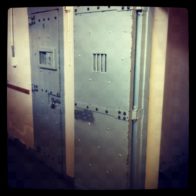One of my colleagues at Hospitality House once called our guest Sue the “most authentic person” he’d ever met. When I shared his words with her recently, she smiled doubtfully and murmured something about “all my flaws.” By that time we’d been acquainted for years, but only distantly. She first came to the shelter in 2011, when I was a monitor covering the busy afternoon shift at our Welcome Center in downtown Grass Valley. Her customary outfit of white blouse and gray pants, along with her short gray hair and gray eyes, camouflaged her well in the Center’s gray-walled rooms. She was as quiet and unnoticeable as a fallen leaf on a forest floor. She rarely looked up from her lap, and never met my eyes. For several months the only thing about her that caught my attention was that no matter how tightly we packed into that postage stamp of a welcome center, she always had the air of being completely alone.
Sue has come and gone from the shelter many times since then. When she isn’t staying with us, she lives in an old car that she drives around as long as she has money for gas. At nightfall she pulls into out-of-the-way corners where she hopes the police won’t find her, though they sometimes do.
Our staff has identified several housing opportunities for her, but she hasn’t been interested, except once when she tried sharing a house with three other women. The experiment lasted a week. “I just can’t live with other people.”
On the day I told her about my colleague’s high opinion we were sitting on the front porch at Utah’s Place, squinting into the afternoon sun. It was brutally hot, but we were too wrapped up in conversation to care. This was the first time we’d ever spoken together about anything at all important, and she was being the most authentic person I’d ever met too. Sometimes people will blurt out their life stories whether you ask them to or not. This time I had asked, though with some trepidation, as by then I’d learned a couple of raw facts about Sue that I wasn’t sure she’d want to share. But she did share—eagerly—taking me into her life story with a dignity and depth of sincerity that went straight to my heart.
Twenty-seven years ago Sue got out of prison, having served a total of 12½ years for two separate offenses. She spent seven and a half of those years in solitary confinement, by her own choice. Her first offense was a bank robbery in Seattle, for which she served three and a half years; the second offense was assault, for which she served nine years. She committed the bank robbery in her early twenties; three weeks after she got out on parole, she assaulted her mother and went back in for nine long years.

Sue described her mother, now deceased, as a “very good person with hellish mood swings she couldn’t control.” That seemed a charitable assessment, considering what Sue told me about the ongoing, violent, even life-threatening abuse she suffered. It was typical in middle-class America in the 1950s that her mother, though severely mentally ill, received no diagnosis or treatment. On the contrary, her illness remained a closely kept family secret. One reason for this silence was that Sue’s father, who considered psychiatry complete charlatanism, dreaded the impact on his wife of fearsome therapies like frontal lobotomy and the primitive shock treatment of the time. Not knowing what else to do, Sue said, he hid out in a locked room listening to his short wave radio.
Sue also suffered from another situation considered unmentionable at that time. “I always felt I was in the wrong body. I should have been male. I was raised with the idea that you were supposed to grow up and get married, but that wasn’t me. I wanted adventure. I was engaged once at the end of high school to a very nice boy, but I couldn’t go through with it.”
Instead, she got in a car, by herself, and headed west. “I was scared that first night out,” she said, “so I asked for help. As soon as I did that I felt a blanket of protection fall over me, and I went into a deep sleep from which I awoke completely refreshed. In all the years since, I’ve never felt that fear again and I’ve never been lonely. It’s not possible to be alone.” The experience was the beginning of what she described as the “mildly mystical” sensibility that enables her to perceive benign presences surrounding her at all times. Her description struck me not at all as a suggestion of mental imbalance, but as precisely what she called it: a spiritual awakening.
In Seattle, with no money, she fell in with the wrong crowd and got involved with hard drugs. Her addiction led her to participate in a mad plot to rob a bank, for which she was immediately caught and sent to prison. Paroled three and a half years later, she went back east to her parents’ house, where repressed memories of her violent childhood suddenly came back. “The mind is geared for survival,” she said. “I had blotted out what I couldn’t process. When I had those memories, it was like I was going through a long tunnel.” Her mother’s indifferent denial that anything ever happened triggered Sue’s violent assault. “After I hit her, I called an ambulance, the police, and my parole officer.”
“My past embarrasses me,” Sue said. “I find that because of it I can’t get close to people. I’ve had a life I can’t talk about. Basically I stay by myself. I can’t function—I spent too many years in solitary. I keep secret the fact that I’m homeless, too, because homeless people don’t get treated very well.”
Sue has been homeless for 27 years, minus the one week she made an attempt to live with others. I asked her how she managed to stay in the shelter with 54 others when she couldn’t bear to live with only three. “Sometimes I have no choice,” she admitted. “Either I run out of money for gas or the car breaks down. And besides, I’m getting older and I don’t always feel that well.” Sue is 69. For a long time she has received SSI (Supplemental Security Income), a small benefit for low-income people 65 or older, blind, or disabled. It’s part of the ever-shrinking safety net established to help people in serious need. She hopes someday to settle into subsidized senior housing in Grass Valley, where she can live by herself— though hope isn’t a word that fits her well. “I don’t know what I’m doing here. I don’t see myself living long. It’s okay. I’m ready to get out of this life.”
For a few minutes we sat in silence, finally broken by my fumbling words about places where she could find spiritual support, including at Hospitality House. But mostly I tried to say that many people would consider her company a valuable gift, would find her scrupulous honesty a teaching and her valiant willingness to express her own vulnerability a healing. She turned to me and I saw that she had tears in her eyes, as I did too.
Sue stays in touch with our social worker at the shelter, and someday, when her name reaches the top of the long, long waiting list, she’ll probably get into a small subsidized apartment. She may choose to spend the rest of her days there alone, but I hope not. I’d like to spend more time with her and be her friend.
